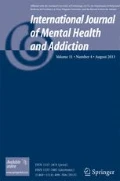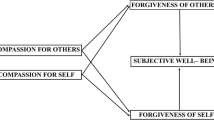Abstract
Forgiveness, particularly forgiveness of oneself, has been associated with lower alcohol use in several samples. We aimed to confirm this finding in college students and expand it by exploring the relationship of self-compassion to alcohol use. Surprisingly, we found that students who drank (n = 54) scored higher than nondrinkers (n = 30) on the self-kindness and mindfulness aspects of the Self-Compassion Scale, as well as the self-forgiveness aspect of the Heartland Forgiveness Scale. There was no statistical difference between social drinkers and binge drinkers. The relationships of self-compassion and forgiveness to alcohol use and abuse should be further investigated to clarify conflicting results, and a longitudinal cohort study could be particularly useful in elucidating whether self-compassion and forgiveness are related to one’s decision to drink alcohol at all.
Similar content being viewed by others
References
Alcoholics Anonymous. (2001). Alcoholics Anonymous: the story of how many thousands of men and women have recovered from alcoholism (4th ed.). New York City, NY: Alcoholics Anonymous World Services.
American College Health Association. (2016). American College Health Association-National College Health Assessment II: Undergraduate Student Reference Group, Executive Summary Fall 2016. Retrieved from Hanover, MD: http://www.acha-ncha.org/docs/ACHA-NCHA-II_UNDERGRAD_ReferenceGroup_ExecutiveSummary_Spring2013.pdf
Baer, J. S. (2002). Student factors: understanding individual variation in college drinking. Journal of Studies on Alcohol. Supplement, (14), 40–53. https://doi.org/10.15288/jsas.2002.s14.40.
Benjamini, Y., & Hochberg, Y. (1995). Controlling the false discovery rate: a practical and powerful approach to multiple testing. Journal of the Royal Statistical Society. Series B (Methodological), 57(1), 289–300.
Berry, J. W., Worthington, E. L., Jr., O'Connor, L. E., Parrott, L., 3rd, & Wade, N. G. (2005). Forgivingness, vengeful rumination, and affective traits. Journal of Personality, 73(1), 183–225. doi:https://doi.org/10.1111/j.1467-6494.2004.00308.x.
Brooks, M., Kay-Lambkin, F., Bowman, J., & Childs, S. (2012). Self-compassion amongst clients with problematic alcohol use. Mindfulness, 3(4), 308–317.
Del Boca, F. K., & Darkes, J. (2003). The validity of self-reports of alcohol consumption: state of the science and challenges for research. Addiction, 98(s2), 1–12.
Dundas, I., Binder, P. E., Hansen, T. G. B., & Stige, S. H. (2017). Does a short self-compassion intervention for students increase healthy self-regulation? A randomized control trial. Scandinavian Journal of Psychology, 58(5), 443–450. https://doi.org/10.1111/sjop.12385.
Epler, A. J., Sher, K. J., & Piasecki, T. M. (2009). Reasons for abstaining or limiting drinking: a developmental perspective. Psychology of Addictive Behaviors, 23(3), 428–442. https://doi.org/10.1037/a0015879.
Ham, L. S., & Hope, D. A. (2003). College students and problematic drinking: a review of the literature. Clinical Psychology Review, 23(5), 719–759. https://doi.org/10.1016/s0272-7358(03)00071-0.
Huang, J. H., DeJong, W., Schneider, S. K., & Towvim, L. G. (2011). Endorsed reasons for not drinking alcohol: a comparison of college student drinkers and abstainers. Journal of Behavioral Medicine, 34(1), 64–73. https://doi.org/10.1007/s10865-010-9272-x.
Huang, J. H., DeJong, W., Towvim, L. G., & Schneider, S. K. (2009). Sociodemographic and psychobehavioral characteristics of US college students who abstain from alcohol. Journal of American College Health, 57(4), 395–410. https://doi.org/10.3200/JACH.57.4.395-410.
Johnson, T. J., & Cohen, E. A. (2004). College students’ reasons for not drinking and not playing drinking games. Substance Use and Misuse, 39(7), 1137–1160. https://doi.org/10.1081/ja-120038033.
Knight, J. R., Sherritt, L., Harris, S. K., Holder, D. W., Kulig, J., Shrier, L. A., Gabrielli, J., & Chang, G. (2007). Alcohol use and religiousness/spirituality among adolescents. Southern Medical Journal, 100(4), 349–355. https://doi.org/10.1097/SMJ.0b013e3180316a32.
Krentzman, A. R. (2013). Review of the application of positive psychology to substance use, addiction, and recovery research. Psychology of Addictive Behaviors, 27(1), 151–165.
Kuntsche, E., Knibbe, R., Gmel, G., & Engels, R. (2005). Why do young people drink? A review of drinking motives. Clinical Psychology Review, 25(7), 841–861. https://doi.org/10.1016/j.cpr.2005.06.002.
Lawler-Row, K. A., Karremans, J. C., Scott, C., Edlis-Matityahou, M., & Edwards, L. (2008). Forgiveness, physiological reactivity and health: the role of anger. International Journal of Psychophysiology, 68(1), 51–58. https://doi.org/10.1016/j.ijpsycho.2008.01.001.
Logan, D. E., Kilmer, J. R., & Marlatt, G. A. (2010). The virtuous drinker: character virtues as correlates and moderators of college student drinking and consequences. Journal of American College Health, 58(4), 317–324.
López, A., Sanderman, R., Smink, A., Zhang, Y., van Sonderen, E., Ranchor, A., & Schroevers, M. J. (2015). A reconsideration of the Self-Compassion Scale’s total score: self-compassion versus self-criticism. PLoS One, 10(7), e0132940.
Lyons, G. C., Deane, F. P., & Kelly, P. J. (2010). Forgiveness and purpose in life as spiritual mechanisms of recovery from substance use disorders. Addiction Research & Theory, 18(5), 528–543.
Mantelou, A., & Karakasidou, E. (2017). The effectiveness of a brief self-compassion intervention program on self-compassion, positive and negative affect and life satisfaction. Psychology (Savannah, Ga.), 08(04), 590–610. doi:https://doi.org/10.4236/psych.2017.84038.
McDonald, J. H. (2014). Handbook of biological statistics (3rd ed.). Baltimore, MD: Sparky House Publishing.
Muris, P., & Petrocchi, N. (2017). Protection or vulnerability? A meta-analysis of the relations between the positive and negative components of self-compassion and psychopathology. Clinical Psychology & Psychotherapy, 24(2), 373–383.
Neff, K. D. (2003). The development and validation of a scale to measure self-compassion. Self and Identity, 2(3), 223–250.
Neff, K. D. (2016a). Does self-compassion entail reduced self-judgment, isolation, and over-identification? A response to Muris, Otgaar, and Petrocchi (2016). Mindfulness, 7(3), 791–797.
Neff, K. D. (2016b). The self-compassion scale is a valid and theoretically coherent measure of self-compassion. Mindfulness, 7(1), 264–274.
Neff, K. D., & Germer, C. K. (2013). A pilot study and randomized controlled trial of the mindful self-compassion program. Journal of Clinical Psychology, 69(1), 28–44. https://doi.org/10.1002/jclp.21923.
Neff, K. D., Rude, S. S., & Kirkpatrick, K. L. (2007). An examination of self-compassion in relation to positive psychological functioning and personality traits. Journal of Research in Personality, 41(4), 908–916.
Raynor, D. A., & Levine, H. (2009). Associations between the five-factor model of personality and health behaviors among college students. Journal of American College Health, 58(1), 73–82.
Rinker, D. V., & Neighbors, C. (2013). Reasons for not drinking and perceived injunctive norms as predictors of alcohol abstinence among college students. Addictive Behaviors, 38(7), 2261–2266. https://doi.org/10.1016/j.addbeh.2013.02.011.
Robinson, E. A., Krentzman, A. R., Webb, J. R., & Brower, K. J. (2011). Six-month changes in spirituality and religiousness in alcoholics predict drinking outcomes at nine months. Journal of Studies on Alcohol and Drugs, 72(4), 660–668.
Scherer, M., Worthington, E. L., Hook, J. N., & Campana, K. L. (2011). Forgiveness and the bottle: promoting self-forgiveness in individuals who abuse alcohol. Journal of Addictive Diseases, 30(4), 382–395. https://doi.org/10.1080/10550887.2011.609804.
Seybold, K. S., Hill, P. C., Neumann, J. K., & Chi, D. S. (2001). Physiological and psychological correlates of forgiveness. Journal of Psychology and Christianity, 20(3), 250–259.
Shin, S. H., Hong, H. G., & Jeon, S.-M. (2012). Personality and alcohol use: the role of impulsivity. Addictive Behaviors, 37(1), 102–107.
Smeets, E., Neff, K., Alberts, H., & Peters, M. (2014). Meeting suffering with kindness: effects of a brief self-compassion intervention for female college students. Journal of Clinical Psychology, 70(9), 794–807. https://doi.org/10.1002/jclp.22076.
Sobell, L. C., & Sobell, M. B. (2003). Alcohol consumption measures. In J. P. Allen & V. B. Wilson (Eds.), Assessing alcohol problems: a guide for clinicians and researchers (2nd ed., pp. 75–99). Bethesda, MD: National Institute on Alcohol Abuse and Alcoholism.
Spellman, B. A. (2015). A short (personal) future history of revolution 2.0. Perspectives on Psychological Science, 10(6), 886–899. https://doi.org/10.1177/1745691615609918.
Szmigin, I., Griffin, C., Mistral, W., Bengry-Howell, A., Weale, L., & Hackley, C. (2008). Re-framing ‘binge drinking’as calculated hedonism: empirical evidence from the UK. International Journal of Drug Policy, 19(5), 359–366. https://doi.org/10.1016/j.drugpo.2007.08.009.
The Core Institute. (2014). Core Alcohol and Drug Survey Retrieved from http://www.core.siuc.edu/
Thompson, L. Y., Snyder, C. R., Hoffman, L., Michael, S. T., Rasmussen, H. N., Billings, L. S., … Roberts, D. E. (2005). Dispositional forgiveness of self, others, and situations. Journal of Personality, 73(2), 313–359. doi:https://doi.org/10.1111/j.1467-6494.2005.00311.x.
Webb, J., & Brewer, K. (2010). Forgiveness and college student drinking in southern Appalachia. Journal of Substance Use, 15(6), 417–433. https://doi.org/10.3109/14659891003706373.
Webb, J. R., Hirsch, J. K., & Toussaint, L. (2011a). Forgiveness and alcohol problems: a review of the literature and a call for intervention-based research. Alcoholism Treatment Quarterly, 29(3), 245–273. https://doi.org/10.1080/07347324.2011.585922.
Webb, J. R., Robinson, E. A., & Brower, K. J. (2011b). Mental health, not social support, mediates the forgiveness-alcohol outcome relationship. Psychology of Addictive Behaviors, 25(3), 462–473. https://doi.org/10.1037/a0022502.
Webb, J. R., Robinson, E. A., Brower, K. J., & Zucker, R. A. (2006). Forgiveness and alcohol problems among people entering substance abuse treatment. Journal of Addictive Diseases, 25(3), 55–67. https://doi.org/10.1300/J069v25n03_08.
Wechsler, H., Dowdall, G. W., Davenport, A., & Castillo, S. (1995). Correlates of college student binge drinking. American Journal of Public Health, 85(7), 921–926.
Wechsler, H., Kuo, M., Lee, H., & Dowdall, G. W. (2000). Environmental correlates of underage alcohol use and related problems of college students. American Journal of Preventive Medicine, 19(1), 24–29.
Weitzman, E. R., Nelson, T. F., & Wechsler, H. (2003). Taking up binge drinking in college: the influences of person, social group, and environment. Journal of Adolescent Health, 32(1), 26–35.
Acknowledgements
The authors would like to thank Dr. Celine Ko and Dr. Fran Grace for their contributions to this project.
Author information
Authors and Affiliations
Corresponding author
Ethics declarations
All procedures followed were in accordance with the ethical standards of the responsible committee on human experimentation (institutional and national) and with the Helsinki Declaration of 1975, as revised in 2000.
Conflict of Interest
The authors declare that they have no conflict of interest.
Statement of Informed Consent
Informed consent was obtained from all patients for being included in the study.
Rights and permissions
About this article
Cite this article
Ellingwood, L., Espinoza, MA., Acevedo, M. et al. College Student Drinkers Have Higher Self-Compassion Scores than Nondrinkers. Int J Ment Health Addiction 17, 658–666 (2019). https://doi.org/10.1007/s11469-018-9919-3
Published:
Issue Date:
DOI: https://doi.org/10.1007/s11469-018-9919-3




